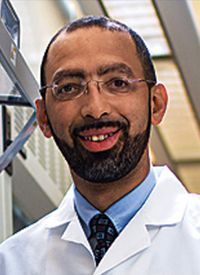Top-Line Results Show Ramucirumab Improves Survival in Second-Line HCC
Overall survival was extended in patients with hepatocellular carcinoma and elevated baseline alpha-fetoprotein (AFP) who received second-line treatment with ramucirumab (Cyramza) versus placebo, according to findings from the phase III REACH-2 trial.
Levi Garraway, MD, PhD

Levi Garraway, MD, PhD
Overall survival (OS) was extended in patients with hepatocellular carcinoma and elevated baseline alpha-fetoprotein (AFP) who received second-line treatment with ramucirumab (Cyramza) versus placebo, according to findings from the phase III REACH-2 trial.
Eli Lilly and Company, the manufacturer of the VEGFR-2 inhibitor also reported that, in addition to the primary OS endpoint, ramucirumab also improved progression-free survival (PFS). Lilly plans to present findings from the study at an upcoming medical conference.
“Advanced liver cancer is an aggressive disease that has a poor prognosisand for those that have elevated AFP levels, the prognosis is even more dismal,” Levi Garraway, MD, PhD, senior vice president, global development and medical affairs, Lilly Oncology, said in a statement.
“The expected survival of these patients is only a few months following first-line treatment if they don't go onto second-line therapy. For this reason, Lilly is encouraged by the results of REACH-2 and the potential for Cyramza to benefit patients in this setting,” added Garraway.
REACH-2 is a follow-up to the phase III REACH trial. In June 2014, Lilly Oncology reported that in the REACH study, second-line treatment with ramucirumab did not improve OS compared with placebo in the full population of patients with advanced HCC.
Investigators later conducted further analyses of the REACH data, including a subgroup analysis which demonstrated that patients with high expression of AFP did experience an OS benefit with ramucirumab.1Based on these findings, the phase III REACH-2 study was launched, with the goal of assessing ramucirumab specifically in patients with AFP-high HCC.
REACH-2 was a multicenter, randomized, double-blind study of patients with HCC who were intolerant to sorafenib (Nexavar) or who progressed while on or following treatment with sorafenib, and had high AFP, defined as an AFP of ≥400 ng/mL. The safety profile for ramucirumab in REACH-2 was similar to previous toxicity data for single-agent use of the drug. Hypertension and hyponatremia were the only grade ≥3 adverse events (AEs) reported at a rate ≥5% for the ramucirumab arm.
In the randomized phase III REACH study, 565 patients with HCC were assigned to 8 mg/kg of intravenous ramucirumab at every 2 weeks (n = 283) or placebo (n = 282). All patients received best supportive care.2The primary endpoint was OS in the intention-to-treat population, with PFS and other measures of response as secondary endpoints.
In the full population of the study, the median OS was 9.2 months with ramucirumab compared with 7.6 months with placebo (HR, 0.87; 95% CI, 0.72-1.05;P= .14). The numerical difference of 1.6 months between the two arms did not cross the barrier for statistical significant.
In the planned analysis of patients with HCC and elevated AFP, the median OS for patients with a baseline AFP >400 ng/mL was 7.8 months in the ramucirumab arm compared with 4.2 months with placebo (HR, 0.674; 95% CI, 0.51-0.90;P= .0059). In contrast, for patients with a baseline AFP <400 ng/mL, OS was 10.1 months with ramucirumab versus 11.8 months for those receiving placebo.
The most frequently reported grade ≥3 AEs in the ramucirumab arm compared with placebo, respectively, were hypertension (12% vs 4%), malignant neoplasm progression (6% vs 4%), ascites (5% vs 4%), asthenia (5% vs 2%), and thrombocytopenia (5% vs <1%). Malignant neoplasm progression was the most frequently reported serious AE.
Some grade ≥3 AEs were more common with placebo compared with ramucirumab, respectively, including increased AST concentration (8% vs 5%), hyperbilirubinemia (5% vs 1%), and increased blood bilirubin (5% vs 2%).
Ramucirumab currently has approved FDA indications for lung cancer, colorectal cancer, and gastric or gastroesophageal junction adenocarcinoma.
References:
- Zhu AX, Ryoo B-Y, Yen C-J, et al. Ramucirumab (RAM) as second-line treatment in patients (pts) with advanced hepatocellular carcinoma (HCC): analysis of patients with elevated α-fetoprotein (AFP) from the randomized phase III REACH study. Presented at: 2015 Gastrointestinal Cancers Symposium; January 15-17, 2015; San Francisco, CA. Abstract 232.
- Zhu AX, Park JO, Ryoo B-Y, et al. Ramucirumab versus placebo as second-line treatment in patients with advanced hepatocellular carcinoma following first-line therapy with sorafenib (REACH): a randomised, double-blind, multicentre, phase 3 trial.Lancet Oncol. 2015; 16(7):859-70. doi: 10.1016/S1470-2045(15)00050-9.